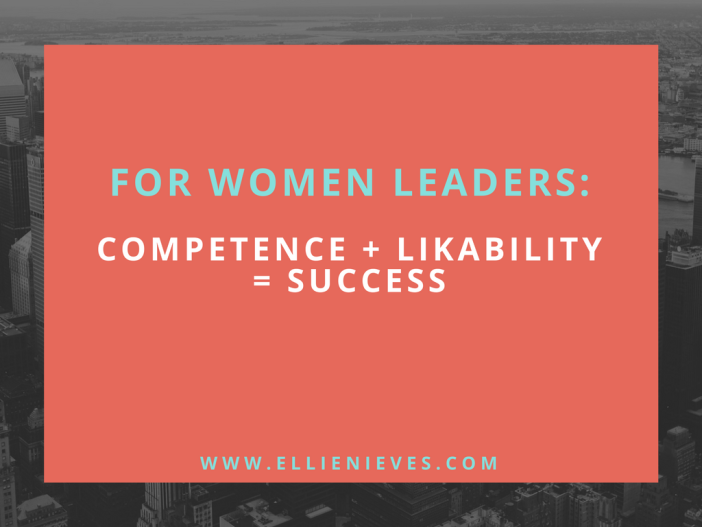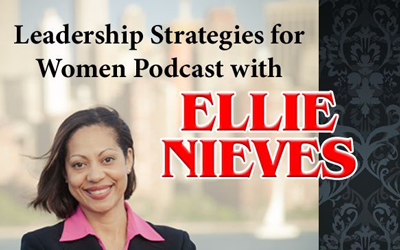
by Ellie Nieves | Leadership Strategies for Women
I recently interviewed Renee Weisman: author, consultant, and former engineer.
Renee Weisman was a distinguished engineer and Director of Engineering at the IBM corporation prior to retiring in 2008. Having spent nearly 40 years in the heavily male dominated semi-conductor engineering industry, often as the only woman, Renee learned firsthand how women can hold themselves back. Renee is the owner of Winning at Work Consulting and the author of the recently-released book, Why Hillary Lost: What Women Can Learn from the 2016 Election. The book focuses on the behaviors women must understand and the biases they must overcome to succeed. She uses the 2016 election to show how the female disadvantage impacted Hillary’s campaign and gives competent women advice on how they can address similar situations. She published her first book, Winning in a Man’s World, in 2008. Renee has two daughters, five grandchildren, and a very supportive husband.
During our interview, Renee shared her experience working in a male-dominated industry. She also explained how this experience gave her a unique insight while witnessing the 2016 presidential election. “I saw Hillary making many of the same mistakes that I’ve spent so much time advising women to avoid,” Renee said. She decided to write a book for women to address the unique challenges Hillary faced as a woman and the lessons all women can learn from her campaign.
Likability vs. Competence Trap
There are two things that occur when women compete for something that’s perceived as a “power-seeking position”:
- We tolerate untrustworthiness and unlikability in a man much more than in a woman
- Competency isn’t necessarily a virtue for a woman. “For a woman, the more successful you become, the less liked or trusted you will be, especially if you’re seeking power,” Renee said.
Renee described several fascinating studies regarding biases related to gender. All these studies show that likability and competence is directly affected by gender, much more than experience or evidence of talent. “We can’t hide behind a curtain at work, and the reality is that the biases are still there, and unfortunately, women have to deal with them,” Renee said.
But Renee remains optimistic. Though the biases are there, they can be managed if they are addressed. “If you ignore them,” Renee said, “they will come back to bite you. They will impact your long-term success in your career.”
So, what can a modern professional woman learn from the 2016 election? Renee provides several pieces of advice:
- If you want to get ahead as a woman, studies and statistics show that it’s more important to be likable than to be competent. “If you’re not trusted and not liked, most people will not care if you’re competent or not,” Renee said.
- Let people know you and be relatable.
- Be more inspiring.
- Avoid being perceived as the “B-words”: bitchy, bossy, bully.
- Find a balance between these perceptions and practice awareness in your behavior.
- Use the correct data. Get your facts straight before you try to convince someone else.
- Get together the right team to work with you and support you. Have a diverse team with many different points of view.
- Understand your audience when you’re speaking.
- Learn how to apologize.
- Address your appearance. “Even today, people judge a woman by how she looks, and then they start listening,” Renee said. “Appearance is critically important, not because you have to look so good, but to make sure appearance is a non-issue. You don’t want to look so different that people are paying attention to what you look like. You want them to pay attention to what you’re saying and doing.”
Renee’s advice would be useful to any woman looking to get ahead in a male-dominated field. Her book, Why Hillary Lost: What Women Can Learn from the 2016 Election, is now available on Amazon Kindle. She has plans to write a new book addressing harassment in the workplace.
You can listen to the full interview on the Leadership Strategies for Women Podcast.

by Ellie Nieves | Podcast by Leadership Strategies for Women
Podcast: Play in new window | Download
Subscribe: Email | | More
Ellie Nieves interviews Julia Dale. Julia is a wife, mother, and an attorney. She is also an avid writer who seeks to encourage moms through her blog entitled: Motherhood Matters. During the interview, Julia shares how shebalances faith, career, and family.

by Ellie Nieves | Leadership Strategies for Women
For women leaders, having confidence is a huge advantage in careers, life, and relationships. It’s the key to attracting the right job, the right people, the right decisions from others, and achieving goals.
All women leaders have a baseline of confidence. Some women leaders have unshakable confidence built upon strong foundations; others find their confidence level is a bit shaky when faced with mistakes, criticisms and failures.
Confidence is closely tied with our sense of self-esteem. Self-esteem enables us to experience ourselves not only accurately but gladly. It’s a realistic, appreciative opinion; we can be honest about our strengths, weaknesses and everything in between, and still feel good about who we are.
There is a difference between the outer appearance of confidence and deeply felt intrinsic self-worth. True self esteem is steady; it doesn’t lead to complacency or overconfidence, but rather is a strong motivator to work hard.
Foundations of Self-Esteem
According to Glenn R. Schiraldi, Ph.D, author of 10 Simple Solutions for Building Self-Esteem, self-esteem is built from three factors: unconditional worth, unconditional love and growth.
- Unconditional Worth: This means that a woman leader’s worth isn’t increased or diminished by external factors, but is based on her true value as a human being. This can be confusing to women who have learned they must achieve and acquire in order to be considered worthy. Once we, as women, believe in our intrinsic worth, we are relieved of the need to judge ourselves and others, or compare and compete on external values and factors. We can choose to value our own innate capacities and see the many ways we contribute to the well-being of ourselves and others.
- Unconditional Love: Abraham Maslow noted that psychological health is not possible without love for the essential core. Even those who have not experienced unconditional love from parents can learn to provide love to themselves and others. Love helps us experience our worth, feel satisfaction, and enjoy growth and life.
- Growth: As women, we feel better about ourselves when we are living constructively, learning, making decisions, developing and growing. Growing does not change our core worth, but it helps us experience it with greater satisfaction. In summary, self-esteem is a sense of satisfaction that comes from recognizing and appreciating our intrinsic worth; it encourages us to choose to love and grow. It’s not based upon comparing and competing. We can enhance and enjoy our sense of self-worth through learning, growing, achievements and goals.
Getting Rid of Negativity
Without doubt, our own critical nature eats away at our confidence more than any outside judgment, mistake or failure. Over-active negative mind chatter can cause women to react defensively in neutral situations.
Many of these habits of thinking are learned and can be unlearned. Forget about blaming parents, teachers, and people who didn’t like us when we were growing up. No matter what happened to us or how we ended up with negative reactions, we can learn to disconnect from harmful automatic thoughts.
We can replace negative thoughts with positive ones that will make us more effective, happier, and self-confident. Ultimately, we are responsible for the thoughts we choose. We can’t control many things in life, but we can control our thoughts.
We lose confidence when we apply negative thinking to ourselves or other people. No one escapes these intrusive thought patterns. The key is to become aware of them. Once we catch ourselves engaging in automatic distortions, we can re-think, reframe, and revise our thoughts.
For example, we might be thinking, “I can’t possibly get this done in time. I’m too slow in the mornings. My brain doesn’t work that way.”
We can reframe the self-talk like this: “I don’t like having to work in a hurry, especially so early. I’m not sure I can finish, but at least I can start. Maybe my brain will wake up after a few stabs at it.”
By acknowledging the reality, we avoid catastrophizing and assuming, and we agree to do what is possible by starting.
When we look at what we can do, instead of what’s wrong, we give ourselves a chance to succeed and grow from the experience. When we guard against distortions and negativity, our confidence grows instead of withers. Our minds start to acquire more positive thinking habits. We set ourselves up for success and build self-confidence.

by Ellie Nieves | Leadership Strategies for Women
Someone in your company may have recently been promoted to a leadership position. This person successfully competed against other qualified candidates, some of whom were probably just as experienced and smart. As often happens in judging one candidate over another, the decision most likely came down to degrees of “executive presence” or what some refer to as the “It” factor.
Executive presence incorporates a range of verbal and nonverbal patterns (one’s appearance, posture, vocal quality, subtle movements)—a whole collection of signals that others process into an evaluative impression of a person. The concept of presence raises serious questions for women with ambitions of career advancement. If, as Malcolm Gladwell suggests in his book Blink, decisions are made intuitively, what do we need to know about “executive presence.”
As it turns out, everyone’s definition of the term seems to differ. But planning your career and determining your leadership development needs shouldn’t be left to guesswork.
Women who want to be promoted to the C-suite, must learn how to acquire or improve their level of executive presence. Women leaders who are already in senior management, must help nurture executive presence in the people they want to groom for succession.
The qualities associated with executive presence can be difficult to learn and practice. Most people aren’t born with executive presence. They develop the requisite skills with experience, maturity and a great deal of effort.
Executive presence should not be confused with speaking or presentation skills. They’re part of the total package, but presence is what you project wherever you are and whatever you’re doing. A woman leader’s challenge lies in managing others’ perceptions of her, which is no small task.
Work to develop the following 11 qualities that contribute to the “It” factor:
- Transparency: Be genuine, open, straightforward, comfortable in your own skin. Aim for truth and clarity, even when difficult issues arise. Don’t try to please or cover up with spin.
- Passion: Love and feel strongly about your profession, job, industry and life in general. See and believe in optimism.
- Clarity: Communicate your thoughts, feelings and insights with crystal clarity and simplicity. Master metaphors and stories that make an impact.
- Intelligence: Develop the ability to process, retain and apply information, whether it’s academic or street-worthy.
- Pattern Recognition: Sharpen your ability to boil down complex factors and mounds of data to rare conclusions. Offer insights others may not see.
- Results-Oriented: Be driven and full of purpose; determined to achieve and succeed. Able to discern dichotomies, unravel paradoxes and work with uncertainties. Flexible and willing to adjust goals. Be decisive under pressure. Have a bias toward action. An attitude of giving, rather than getting. Work in the service of common goals for the organization’s and society’s higher values.
- Confidence: Communicate confidence even when you don’t have all the answers. Ask questions and listen.
- Humility: Be willing to admit mistakes. Seek answers and advice; listen to others.
- Courage: Be willing to take risks and positions against considerable odds. Work to perceive possibilities and innovations.
- Humor: Develop a balanced sense of humor that is not over-the-top, but in the right measure to disarm others’ defenses.
- Social: Genuinely care about others; see both strengths and weaknesses in people. Allow for people to learn from mistakes. Promote healthy self-esteem in others. Respect others and show a real—not manufactured or superficial—interest in them.
Keep in mind that no single woman leader possesses all of these qualities in abundance. For example, many successful CEOs with strong executive presence lack one or more of the likeability factors, such as humor and humility, but they make up for it in other domains. Ultimately, your executive presence is reflected in the energy and image you convey, along with your understanding of what works and what doesn’t.








